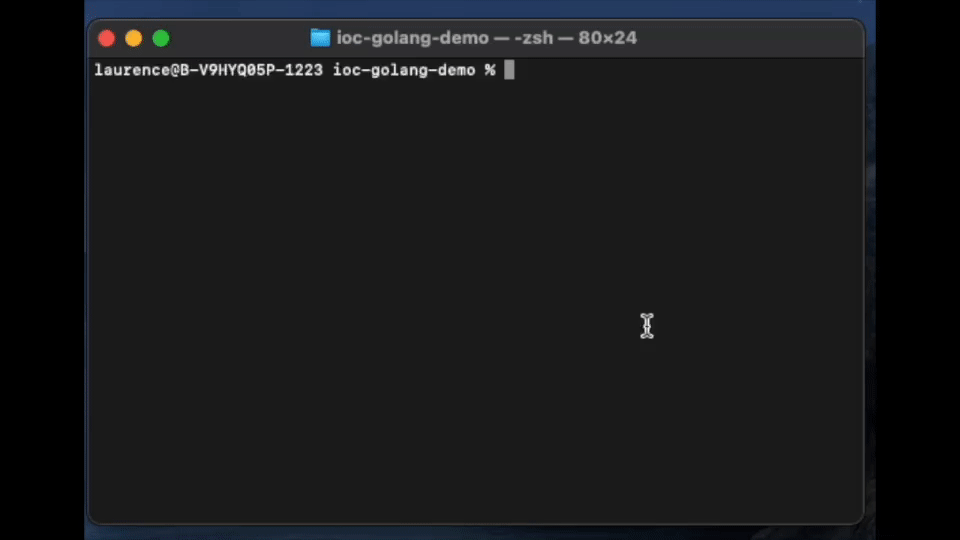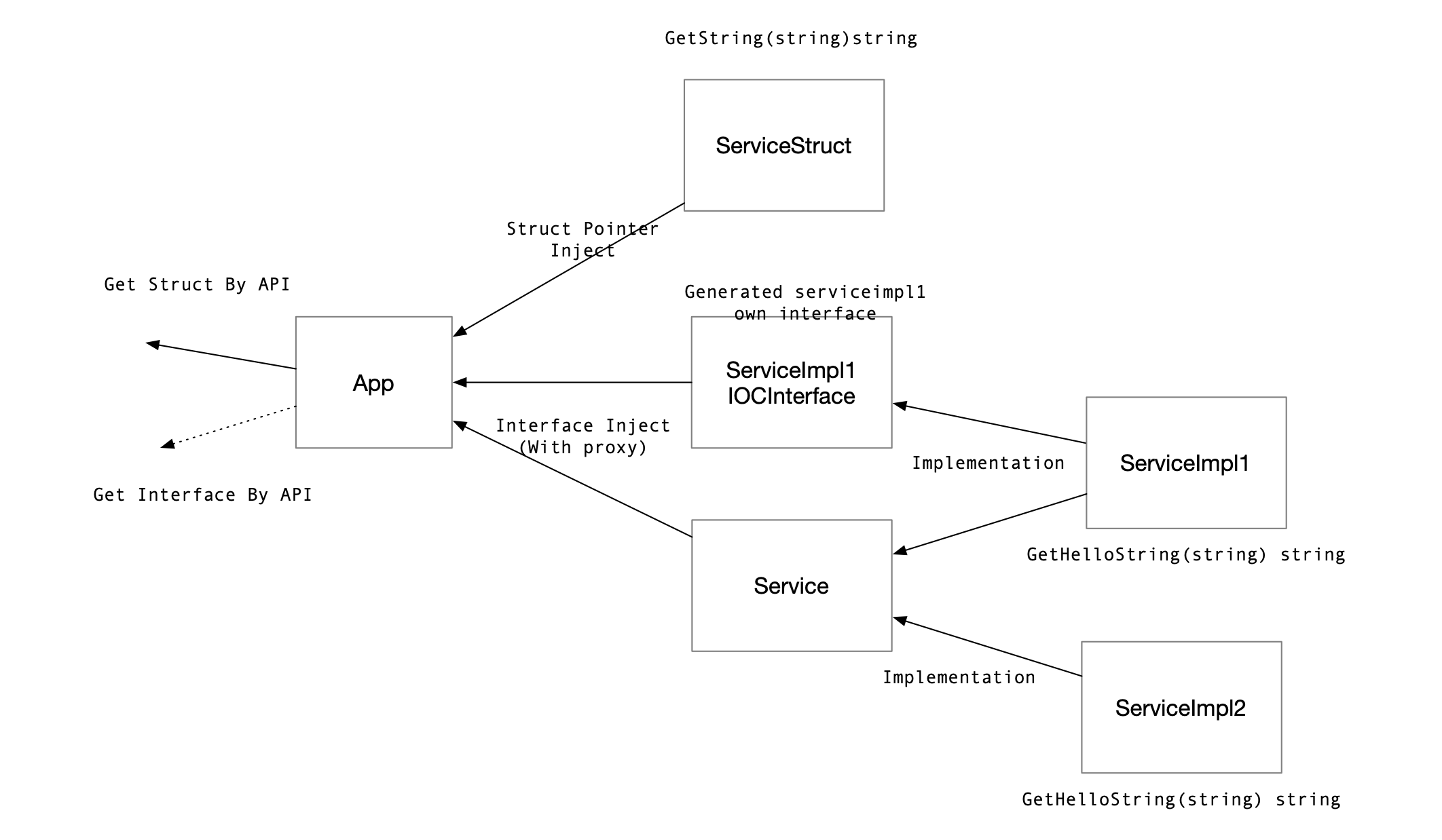___ ___ ____ _
|_ _| / _ \ / ___| __ _ ___ | | __ _ _ __ __ _
| | | | | | | | _____ / _` | / _ \ | | / _` | | '_ \ / _` |
| | | |_| | | |___ |_____| | (_| | | (_) | | | | (_| | | | | | | (_| |
|___| \___/ \____| \__, | \___/ |_| \__,_| |_| |_| \__, |
|___/ |___/
English | 中文
IOC-golang is a powerful golang dependency injection framework that provides a complete implementation of IoC containers. Its capabilities are as follows:
-
Supports dependency injection of any structure and interface, we also support object life cycle management mechanism
-
Can take over object creation, parameter injection, factory methods. Customizable object parameter source
- Based on the idea of AOP, we provide struct proxy layer for all struct registered to ioc-golang. In the scene of interface oriented development, we can use many devlops features based on the extenablility of this proxy AOP layer. Such as interface listing, param value watching, method level tracing, performance badpoint analysis, fault injection, method level tracing in distributed system and so on.
Automatic struct descriptor codes generation capability
- We provide a code generation tool, and developers can annotate the structure through annotations, so as to easily generate structure registration code.
- Support the extension of struct to be injected, the extension of autowire model, and the extension of the debug AOP layer.
- Provides pre-defined objects and middleware sdk for injection directly.
- aop: Debug module: Provide debugging API, provide debugging injection layer basic implementation and extendable API.
- autowire: Provides two basic injection models: singleton model and multi-instance model
- config: Configuration loading module, responsible for parsing ion-golang's configuration files
- extension: Component extension directory: Provides preset implementation structures based on various domain. Such as database, cache, pubs.
- example: example repository
- iocli: code generation/program debugging tool
% go install github.com/alibaba/ioc-golang/[email protected]
% iocli
helloWe will develop a project with the following topology, This tutorial can show:
- Registry codes generation
- Interface injection
- Struct pointer injection
- Get object by API
- Debug capability, list interface, implementations and methods; watch real-time param and return value.
All the code the user needs to write: main.go
package main
import (
"fmt"
"time"
"github.com/alibaba/ioc-golang"
)
// +ioc:autowire=true
// +ioc:autowire:type=singleton
type App struct {
// inject main.ServiceImpl1 pointer to Service interface with proxy wrapper
ServiceImpl1 Service `singleton:"main.ServiceImpl1"`
// inject main.ServiceImpl2 pointer to Service interface with proxy wrapper
ServiceImpl2 Service `singleton:"main.ServiceImpl2"`
// inject ServiceImpl1 pointer to Service1 's own interface with proxy wrapper
// this interface belongs to ServiceImpl1, there is no need to mark 'main.ServiceImpl1' in tag
Service1OwnInterface ServiceImpl1IOCInterface `singleton:""`
// inject ServiceStruct struct pointer
ServiceStruct *ServiceStruct `singleton:""`
}
func (a *App) Run() {
for {
time.Sleep(time.Second * 3)
fmt.Println(a.ServiceImpl1.GetHelloString("laurence"))
fmt.Println(a.ServiceImpl2.GetHelloString("laurence"))
fmt.Println(a.Service1OwnInterface.GetHelloString("laurence"))
fmt.Println(a.ServiceStruct.GetString("laurence"))
}
}
type Service interface {
GetHelloString(string) string
}
// +ioc:autowire=true
// +ioc:autowire:type=singleton
type ServiceImpl1 struct {
}
func (s *ServiceImpl1) GetHelloString(name string) string {
return fmt.Sprintf("This is ServiceImpl1, hello %s", name)
}
// +ioc:autowire=true
// +ioc:autowire:type=singleton
type ServiceImpl2 struct {
}
func (s *ServiceImpl2) GetHelloString(name string) string {
return fmt.Sprintf("This is ServiceImpl2, hello %s", name)
}
// +ioc:autowire=true
// +ioc:autowire:type=singleton
type ServiceStruct struct {
}
func (s *ServiceStruct) GetString(name string) string {
return fmt.Sprintf("This is ServiceStruct, hello %s", name)
}
func main() {
// start to load all structs
if err := ioc.Load(); err != nil {
panic(err)
}
// Get Struct
app, err := GetAppSingleton()
if err != nil {
panic(err)
}
app.Run()
}
The proxy wrapped layer mentioned above, is a proxy layer injected by ioc-golang by default, when developer want to inject an object to interface field, or get with interface by API. Inject to interface is recommended by us. Every object injected with proxy wrapped layer would have devops feature.
After writing, you can exec the following cli command to init go mod and generate codes. (mac may require sudo due to permissions during code generation)
% go mod init ioc-golang-demo
% export GOPROXY="https://goproxy.cn"
% go mod tidy
% go get github.com/alibaba/ioc-golang@master
% sudo iocli genIt will be generated in the current directory: zz_generated.ioc.go, developers do not need to care about this file, 'GetAppSingleton' method mentioned above is defined in generated code.
//go:build !ignore_autogenerated
// +build !ignore_autogenerated
// Code generated by iocli
package main
import (
autowire "github.com/alibaba/ioc-golang/autowire"
normal "github.com/alibaba/ioc-golang/autowire/normal"
"github.com/alibaba/ioc-golang/autowire/singleton"
util "github.com/alibaba/ioc-golang/autowire/util"
)
func init() {
normal.RegisterStructDescriptor(&autowire.StructDescriptor{
Factory: func() interface{} {
return &app_{}
},
})
singleton.RegisterStructDescriptor(&autowire.StructDescriptor{
Factory: func() interface{} {
return &App{}
},
})
...
func GetServiceStructIOCInterface() (ServiceStructIOCInterface, error) {
i, err := singleton.GetImplWithProxy(util.GetSDIDByStructPtr(new(ServiceStruct)), nil)
if err != nil {
return nil, err
}
impl := i.(ServiceStructIOCInterface)
return impl, nil
}
See the file tree:
% tree
.
├── go.mod
├── go.sum
├── main.go
└── zz_generated.ioc.go
0 directories, 4 filesgo run .
Console printout:
___ ___ ____ _
|_ _| / _ \ / ___| __ _ ___ | | __ _ _ __ __ _
| | | | | | | | _____ / _` | / _ \ | | / _` | | '_ \ / _` |
| | | |_| | | |___ |_____| | (_| | | (_) | | | | (_| | | | | | | (_| |
|___| \___/ \____| \__, | \___/ |_| \__,_| |_| |_| \__, |
|___/ |___/
Welcome to use ioc-golang!
[Boot] Start to load ioc-golang config
[Config] Load default config file from ../conf/ioc_golang.yaml
[Config] Load ioc-golang config file failed. open /Users/laurence/Desktop/workplace/alibaba/conf/ioc_golang.yaml: no such file or directory
The load procedure is continue
[Boot] Start to load debug
[Debug] Debug port is set to default :1999
[Boot] Start to load autowire
[Autowire Type] Found registered autowire type normal
[Autowire Struct Descriptor] Found type normal registered SD main.serviceStruct_
[Autowire Struct Descriptor] Found type normal registered SD main.app_
[Autowire Struct Descriptor] Found type normal registered SD main.serviceImpl1_
[Autowire Struct Descriptor] Found type normal registered SD main.serviceImpl2_
[Autowire Type] Found registered autowire type singleton
[Autowire Struct Descriptor] Found type singleton registered SD main.App
[Autowire Struct Descriptor] Found type singleton registered SD main.ServiceImpl1
[Autowire Struct Descriptor] Found type singleton registered SD main.ServiceImpl2
[Autowire Struct Descriptor] Found type singleton registered SD main.ServiceStruct
[Debug] Debug server listening at :1999
This is ServiceImpl1, hello laurence
This is ServiceImpl2, hello laurence
This is ServiceImpl1, hello laurence
This is ServiceStruct, hello laurence
...It shows that the injection is successful and the program runs normally.
Debug the app
Following logs can be found in console output:
[Debug] Debug server listening at :1999Open a new console, use iocli 's debug feature to list all structs with proxy layer, and their methods. Default port is 1999.
% iocli list
main.ServiceImpl1
[GetHelloString]
main.ServiceImpl2
[GetHelloString]
Watch real-time param and return value. We take main.ServiceImpl 's 'GetHelloString' method as an example. The method would be called twice every 3s :
% iocli watch main.ServiceImpl1 GetHelloString
========== On Call ==========
main.ServiceImpl1.GetHelloString()
Param 1: (string) (len=8) "laurence"
========== On Response ==========
main.ServiceImpl1.GetHelloString()
Response 1: (string) (len=36) "This is ServiceImpl1, hello laurence"
========== On Call ==========
main.ServiceImpl1.GetHelloString()
Param 1: (string) (len=8) "laurence"
========== On Response ==========
main.ServiceImpl1.GetHelloString()
Response 1: (string) (len=36) "This is ServiceImpl1, hello laurence"
...// +ioc:autowire=true
The code generation tool recognizes objects marked with the +ioc:autowire=true annotation
// +ioc:autowire:type=singleton
The marker autowire model is the singletonMore code generation annotations can be viewed at iocli.
You can go to ioc-golang/example for more examples and advanced usage.
You can go to E-commercial system demo based on ioc-golang to refer to applications system on distributed scene.
IOC-golang developed by Alibaba and licensed under the Apache License (Version 2.0). See the NOTICE file for more information.
Welcome to join dingtalk group 44638289 if you are interested with the project.
If you think this project is interesting, or helpful to you, please give a star!







